XX年五年级英语上册重点与练习(新人教版)【DOC范文整理】
人教版五年级英语上册各单元以及下册unit1知识点详细归纳(附带练习题)

Un it 1 What 'she like 、单元词汇old年老的polite 有礼貌的clever 聪明的you ng年轻的funny滑稽的kind和蔼的strict严格的hard-working工作努力的helpful愿意帮助的shy害羞的二、单元知识点一般疑问句的改法:①类句子:含有be动词作谓语的句子、或者含有情态动词(will、can、should等)的英语句子,改为疑问句时,把be动词/情态动词提到句首即可!例如:He is very helpful Is he very helpful ?They are hard-working Are they hard-working ?Mike can do kung fu Can Mike do kung fu ?②类句子:含有实义动词作谓语的句子,改为疑问句时,在句首加do/does,主语是第三人称单数时加does,并且谓语动词要去掉三单形式变回原形!例如:I know Mary 宀Do you know Mary ?They play football on the playground ? Do they play football on the playground ?三单形式:当主语是第三人称单数时,后面的实义动词谓语必须是三单形式(一般在实义动词后加s)例如:I read books 宀He reads booksYou play the piano He plays the piano三单形式的句子改为一般疑问句:Does he read books?Does he play the piano ?另外要注意:第一人称和第二人称要互相转换!练习:将下列句子改为一般疑问句:1、I am very helpfull at home _________________________________2、She will come to my birthday party __________________________3、I know ________________________________________________4、He knows _____________________________________________1、Do you know Mr You ng ?这是一个疑问句,陈述句原来是肯定回答:Yes, I do否定回答:No, I don '我的笔I pen (x) my pen (V)I know Mr You ng,②类句子你的尺子you ruler (x) your ruler (V)____ pen 我的钢笔__________ parents 她的父母___________ h ouse 他们的房子3、Is your English teacher strict?原来的陈述句:My English teacher is strict,①类句子,所以改为疑问句只须把be动词提到句首即可,my 变为yourBe 动词+ 人+ 描述体貌特征或性格特点的形容词?意为“某人是 ......... 的吗?”肯定回答:Yes,人+ be动词否定回答:No,人+ be动词not例如:——Is your P.E. teacher funny?——Yes, he is——Are your parents strict ?——No, they aren 't 你的体育老师高吗?是的,她很高你的数学老师年轻吗?不,她不年轻4、如何询问别人某一学科的老师是谁?可以借用特殊疑问词who (谁)的帮助,Who ' s your +学科+ teacher ?意为"你的........ 老师是谁?”回答:Mr/Mrs/Miss + 姓氏例如:——Who is your English teacher ?——Miss Green——Who is your math teacher ?——Mr Ma5、what is he like ?在这句话中, like 不是“喜欢”的意思,而是“像....... 一样”的意思,因为like有两种词性:① 动词,意为“喜欢”,实义动词谓语,不能和be动词同时出现;I like hamburger ;I like apples and grapes② 介词,意为“像……一样”,可以跟在be动词后面作表语;Their child is like him His words are like wisdom询问别人的体貌特征或性格特点的句型:What ' s +某人+ like?,意为询问“某人是像……样的/某人怎么样?” 回答:He' s/She's+ 描述体貌特征或性格特点的形容词.例如:——What is she like?——She is tall and thin——What is your art teacher like ?——He is young and funny6、频率副词sometimes (有时候),usually (通常),often (经常),通常放在主语和动作之间I sometimes read books in the morningI often play football on the playgroundI usually do my homework at 8 o 'clock7、 m ust 是情态动词,情态动词后面跟谓语动词原形(两类谓语)He is tall and strongHe must be tall and strongShe is our new English teacherShe will be our new English teacher 8、 l et me help youLet sb do sth , sb = somebody (某人),sth = something (某事),意为"让某人做某 事”, sb 如果是人称代词,那必须得是宾格形式的Let 'sgo to school = let us go to school Let Mike help you Let him come inUnit 1 单元习题、选出不同类的单词,并将其序号填到题前的括号内。
新人教版PEP五年级英语上册各单元知识点复习总结
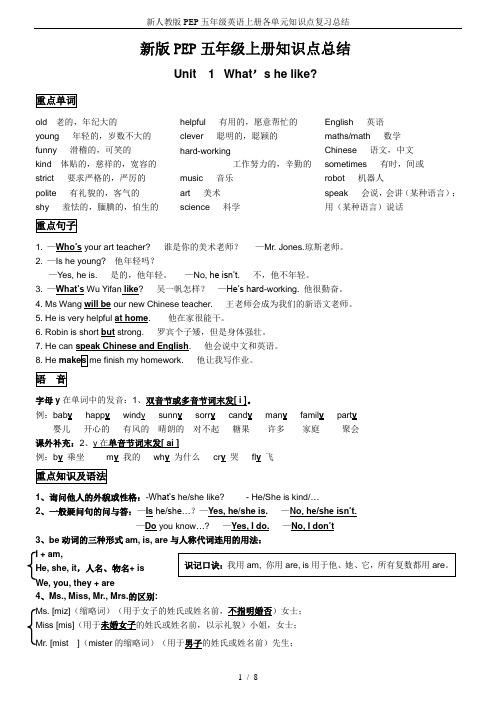
新人教版PEP五年级英语上册各单元知识点复习总结新版PEP五年级上册知识点总结Unit 1 What’s he like?重点单词old 老的,年纪大的young 年轻的,岁数不大的funny 滑稽的,可笑的kind 体贴的,慈祥的,宽容的strict 要求严格的,严厉的polite 有礼貌的,客气的shy 羞怯的,腼腆的,怕生的helpful 有用的,愿意帮忙的clever 聪明的,聪颖的hard-working工作努力的,辛勤的music 音乐art 美术science 科学English 英语maths/math 数学Chinese 语文,中文sometimes 有时,间或robot 机器人speak 会说,会讲(某种语言);用(某种语言)说话重点句子1. —Who’s your art teacher? 谁是你的美术老师?—Mr. Jones.琼斯老师。
2. —Is he young? 他年轻吗?—Yes, he is. 是的,他年轻。
—No, he isn’t.不,他不年轻。
3. —What’s Wu Yifan like? 吴一帆怎样?—He’s hard-working. 他很勤奋。
4. Ms Wang will be our new Chinese teacher. 王老师会成为我们的新语文老师。
5. He is very helpful at home. 他在家很能干。
6. Robin is short but strong. 罗宾个子矮,但是身体强壮。
7. He can speak Chinese and English. 他会说中文和英语。
8. He makes me finish my homework. 他让我写作业。
语音字母y在单词中的发音:1、双音节或多音节词末发[ i ]。
例:bab y happ y windy sunn y sorr y cand y man y famil y part y婴儿开心的有风的晴朗的对不起糖果许多家庭聚会课外补充:2、y在单音节词末发[ ai ]例:b y 乘坐m y 我的wh y 为什么cr y 哭fl y 飞重点知识及语法1、询问他人的外貌或性格:-What’s he/she like? - He/She is kind/…2、一般疑问句的问与答:—Is he/she…?—Yes, he/she is.—No, he/she isn’t.—Do you know…? —Yes, I do.—No, I don’t3、be动词的三种形式am, is, are与人称代词连用的用法:I + am,He, she, it,人名、物名+ isWe, you, they + are4、Ms., Miss, Mr., Mrs.的区别:Ms. [miz](缩略词)(用于女子的姓氏或姓名前,不指明婚否)女士;Miss [mis](用于未婚女子的姓氏或姓名前,以示礼貌)小姐,女士;Mr. [mist](mister的缩略词)(用于男子的姓氏或姓名前)先生;识记口诀:我用am, 你用are, is用于他、她、它,所有复数都用are。
2023年人教版(PEP)五年级英语上册总复习要点

五年级英语上册总复习要点PEP英语五年级上册四会单词词汇表Unit 1:young 年轻的 funny 滑稽可笑的tall 高的 strong 强壮的kind 和蔼的old 年老的helpful 有用的thin 瘦的Mr 先生like 像、喜欢strict 严格的clever 聪明的 polite有礼貌的quiet 安静的Unit 2:Mondy 星期一Tuesday 星期二Wednesday 星期三Thursday 星期四Friday 星期五Saturday 星期六Sunday 星期天have 有、吃 on 在…..时候do homework 做作业watch TV 看电视read books 读书wash my clothes洗我的衣服play football踢足球Unit 3:三明治 sandwich fish 鱼salad 沙拉冰激淋 ice cream potato 土豆tomato 西红柿for 为lunch 中餐sweet 甜的hot辣的fresh 新鲜的favourite 最喜欢的fruit 水果healthy健康的delicious可口的tea茶五年级上册四会句子:1.谁是你的英语老师?王老师。
Who’s your English teacher?Mr Wang .2.他长得什么样?他(是)高而强壮。
What’s he like ?He’s tall and strong . 3.她很安静吗?不是的。
她很活跃的。
Is she quiet ?No, she isn’t. She’s very active.4.她很严格么?是的,但她很和蔼的。
Is she strict ?Yes, she is , but she’s very kind .5 今天星期几?星期二。
What day is it today ?It’s Tuesday.6 星期二你们上什么课?What do you have on Tuesdays ?7 我们上数学和科学课。
人教版PEP英语五年级(上)Unit3知识及练习

人教版PEP英语五年级(上)Unit3知识及练习人教版PEP英语五年级(上)Unit 3(翻译、单元知识点、同步练习)课文翻译Unit3教材第22页课文翻译What's your favourite food?你最喜欢吃什么食物?Salad.蔬菜沙拉。
The sandwich is delicious.三明治很关味。
Unit3教材第23页课文翻译Very sweet.Yum!非常甜。
美味!Don't eat too much!不要吃太多!What would you like to eat?你想吃什么?Salad.It's healthy.蔬菜沙拉。
它很健康。
I'd like some noodles.It's my birthday today.我想要(吃)一些面条。
今天是我的生日。
Happy birthday!生日快乐!Thank you.谢谢你。
Unit3教材A部分课文翻译1Let's try部分翻译Sarah is hungry.What would she like to eat? Listen and fill in the blanks.萨拉饿了。
她想吃什么?听一听并填空。
She would like some____and____.她想要(吃)一些____和____。
bread面包 noodles面条 chicken鸡肉Sarah:Mum, I'm hungry!萨拉:妈妈,我饿了!Mum:What would you like to eat?妈妈:你想吃什么?Sarah:I'd like some bread and chicken,please.萨拉:我想要一些面包和鸡肉。
Mum:Here you are,dear.Have some chickensandwiches.妈妈:给你,亲爱的。
吃一些鸡肉三明治。
Sarah:Thanks,Mum.萨拉:谢谢,妈妈。
(完整版)人教版--五年级英语上册重点句型总结与练习

人教版--五年级英语上册重点句型总结与练习Unit1 What’s he like?询问某人外貌特征或性格特点的句型1.What’s +主语(第三人称单数)+like? “某人什么样?”He/She/Wu Yifan is +表示外貌特征或性格特点的形容词.例:What’s Miss Chen like?She is kind.2.Be动词+主语+表示外貌特征或性格特点的形容词?肯定回答:Yes, 主语+be动词.否定回答:No, 主语+be动词+not.例:Is your Chinese teacher strict?Yes, she is.练一练,我会做!1. _Who’s_ your music teacher? ---Miss White.2. _What’s_ your English teacher like ?---She is kind and funny.3.I __am___ helpful. (be)4.The girl___is__ polite. (be)5.They _are__ hard-working. (be)6. He is very funny. (改写成一般疑问句)Is he very funny?7. Mr Gao is our Chinese teacher. (改写成否定句)Mr Gao isn’t our Chinese teacher.8. Is he old ? ( 作否定回答)No, he isn’t.9.She’s thin and tall. (就划线部分提问)What’s she like?10.我们的数学老师很严厉。
(翻译)Our maths teacher is strict.Unit2 My week1.询问今天星期几:What day is it today?It is +星期(Monday, Tuesday...)2.询问你在星期几有什么课的句型:What do you have on +星期名称?I / We have +课程名称.例:What do you have on Mondays?I have Chinese, maths and English.3.询问对方“经常做某事吗”的句型:Do you often +动词原形+其他(时间状语/地点状语)?肯定回答:Yes, I do.否定回答:No, I don’t.例:Do you often play the pipa on the weekend?No, I don’t.4.询问你经常做什么的句型:What do you often +do+其他(时间状语/地点状语)?I/We often...例:What do you often do on the weekend?I often read books.练一练,我会做!1.What do you have on Thursday?I have Chinese and English.2. Do you often listen to music on the weekend.----Yes, I do.3. What do you often do on the weekend?I often play ping-pong.4.I have art, maths and music on Tuesday.(就划线部分提问)What do you have on Tuesday?5.I often read books in this park.(改为一般疑问句)Do you often read books in this park?6.Do you often play football on the weekend?(作否定回答)No, I don’t.7.What day is it today?(就实际情况回答)It’s Tuesday.Unit3 What would you like?1.询问对方想吃什么的句型:What would you like to eat?a hamburger, please.I’d like an apple.some sandwich es, please./A sandwich, please.2.询问对方想喝什么的句型:What would you like to drink?I’d like some tea.3.询问对方最喜欢的东西(食物/课程......)的句型?What’s your favourite food?食物名称./ I love +食物名称. / My favourite food is+食物名称. 例:Wha t’s your favourite food?Noodles. / I love noodles. / My favourite food is noodles.4.描述食物的味道的句型:主语+be动词+表示食物味道的形容词.例:It is sweet.The vegetables are healthy.They’re delicious.练一练,我会做!1.What would you like to eat ?I’d like a sandwich, please.2.What would you like to drink ?I’d like some water, please.3. It is hot.(be)4. The vegetables are delicious.(be)5. They are fresh.(be)6. I’d like some hamburgers .(hamburger)7. What is your favourite food?----Salad.Unit4 What can you do?1.询问对方会做什么的句型What can you do?I / We can +动词原形.例:What can you do for the party?I can play the piano.2. 询问对方“会做某事吗”的句型Can you + 动词原形+其他(时间状语/地点状语)?肯定回答:Yes, I/we can.否定回答:No, I/we can’t.例:Can you cook at home?Yes, I can.练一练,我会做!1.What can you do? I can swim .(swim)2.Can you cook ? No, I can’t .3.Can you cook ? Yes, I can.4.Can you wash your clothes at home?( 做否定回答)No, I can’t.5.I can sing English songs. (改为否定句)I can’t sing English songs.6.I can do some kung fu.(改为一般疑问句)Can you do any kung fu?7.I can play the erhu for the party.(就划线部分提问)What can you do for the party?Unit5 There is a big bed. Unit6 In a nature park 1.询问某地有什么:What's in the room/park?回答“某处有某人”:There+be动词+某人/某物(+地点).(1)单数句:There+is +a/an+可数名词单数(+地点).例:There is a big bed in my room.改为否定句:There isn’t a big bed in my room.(2)复数句:There+are +(some/many/lots of...)可数名词复数(+地点).例:There are some tree s in the forest.改为否定句:There aren’t any trees in the forest.2.询问“某处有什么吗”的句型Be动词+there+某人/某物(+地点)?肯定回答:Yes, there+ be.否定回答:No, there+ be+not.单数句:Is there a/an +可数名词单数(+地点)?肯定回答:Yes, there is.否定回答:No, there isn’t.例:Is there an apple on the plate?No, there isn’t.复数句:Are there any +可数名词复数(+地点)?肯定回答:Yes,there are.否定回答:No, there aren’t.例:Are there any lakes in the nature park?Yes, there are.3. 询问物品在哪里: Where is+ 某种物品?It is+表示方位的介词+其他.例: Where is the ball?It is beside the dog.练一练,我会做!1.There is a tree beside the house.(be)2.There is an apple and an egg on the plate.(a/an)3.There are some hills in front of the house.(be)4.Are there any villages in the nature park?(some)----Yes, there are .5.Are there any buildings in the nature park?(building) ----No, there aren’t .6.What’s in the room? There is a big bed.7.Where is the desk? It’s in front of the chair.8.Is there a white mouse in the room?(作否定回答)No, there isn’t.9.There is a football behind the door.(改成否定句)There isn’t a football behind the door.10.The clock is beside the picture. (就划线部分提问)Where is the clock?11.There are many bottles on the desk.(改成单数句)There is a bottle on the desk.12.There are lots of plants in the garden.(改成一般疑问句)Are there lots of plants in the garden?13.There are some bikes in the house.(改成否定句)There aren’t any bikes in the house?14. There is a big photo above the computer.(就划线部分提问)What’s above the computer?。
新版人教版五年级上册英语全部作文范文
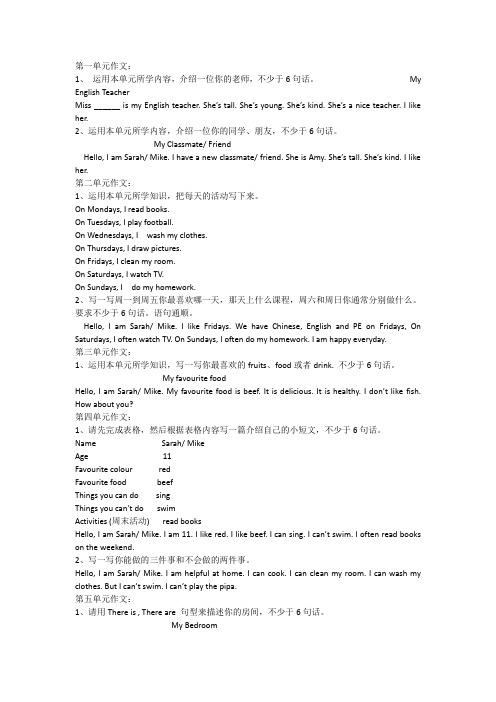
第一单元作文:1、运用本单元所学内容,介绍一位你的老师,不少于6句话。
My English TeacherMiss ______ is my English teacher. She’s tall. She’s young. She’s kind. She’s a nice teacher. I like her.2、运用本单元所学内容,介绍一位你的同学、朋友,不少于6句话。
My Classmate/ FriendHello, I am Sarah/ Mike. I have a new classmate/ friend. She is Amy. She’s tall. She’s kind. I like her.第二单元作文:1、运用本单元所学知识,把每天的活动写下来。
On Mondays, I read books.On Tuesdays, I play football.On Wednesdays, I wash my clothes.On Thursdays, I draw pictures.On Fridays, I clean my room.On Saturdays, I watch TV.On Sundays, I do my homework.2、写一写周一到周五你最喜欢哪一天,那天上什么课程,周六和周日你通常分别做什么。
要求不少于6句话。
语句通顺。
Hello, I am Sarah/ Mike. I like Fridays. We have Chinese, English and PE on Fridays, On Saturdays, I often watch TV. On Sundays, I often do my homework. I am happy everyday.第三单元作文:1、运用本单元所学知识,写一写你最喜欢的fruits、food或者drink. 不少于6句话。
最新完整人教版五年级英语上册第四单元知识点归纳总结及作文范文
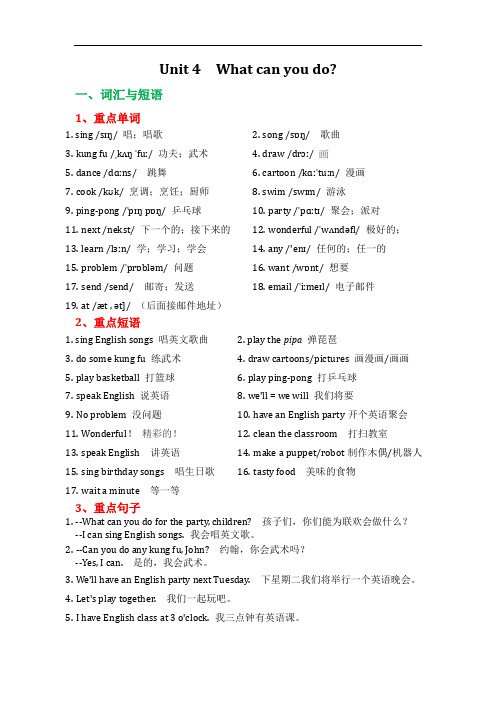
Unit 4 What can you do?一、词汇与短语1、重点单词1. sing /sɪŋ/ 唱;唱歌2.song /sɒŋ/ 歌曲3.kung fu /ˌkʌŋ ˈfuː/ 功夫;武术4.draw /drɔː/ 画5.dance /dɑːns/ 跳舞6.cartoon /kɑːˈtuːn/ 漫画7.cook /kʊk/ 烹调;烹饪;厨师8.swim /swɪm/ 游泳9.ping-pong /ˈpɪŋ pɒŋ/ 乒乓球10.party /ˈpɑːtɪ/ 聚会;派对11.next /nekst/ 下一个的;接下来的12.wonderful /ˈwʌndəfl/ 极好的;13.learn /lɜːn/ 学;学习;学会14.any /'enɪ/ 任何的;任一的15.problem /ˈprɒbləm/ 问题16.want /wɒnt/ 想要17.send /send/ 邮寄;发送18.email /ˈiːmeɪl/ 电子邮件19.at /æt , ət]/ (后面接邮件地址)2、重点短语1. sing English songs 唱英文歌曲2. play the pipa弹琵琶3.do some kung fu 练武术4.draw cartoons/pictures 画漫画/画画5.play basketball 打篮球6.play ping-pong 打乒乓球7.speak English 说英语8.we'll = we will 我们将要9.No problem 没问题10.have an English party开个英语聚会11.Wonderful!精彩的!12.clean the classroom 打扫教室13.speak English 讲英语14.make a puppet/robot制作木偶/机器人15.sing birthday songs 唱生日歌16.tasty food 美味的食物17.wait a minute 等一等3、重点句子1. --What can you do for the party, children? 孩子们,你们能为联欢会做什么?--I can sing English songs. 我会唱英文歌。
最新最全人教版小学英语五年级上册知识点归纳汇总
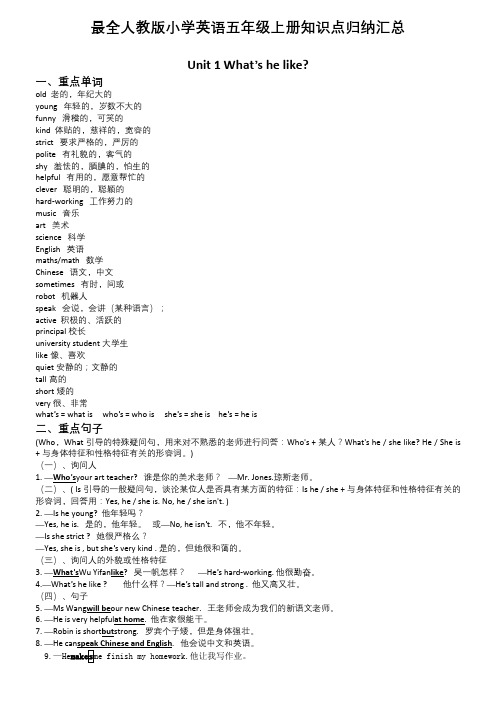
最全人教版小学英语五年级上册知识点归纳汇总Unit 1 What’s he like?一、重点单词old 老的,年纪大的young 年轻的,岁数不大的funny 滑稽的,可笑的kind 体贴的,慈祥的,宽容的strict 要求严格的,严厉的polite 有礼貌的,客气的shy 羞怯的,腼腆的,怕生的helpful 有用的,愿意帮忙的clever 聪明的,聪颖的hard-working 工作努力的music 音乐art 美术science 科学English 英语maths/math 数学Chinese 语文,中文sometimes 有时,间或robot 机器人speak 会说,会讲(某种语言);active 积极的、活跃的principal 校长university student大学生like像、喜欢quiet安静的;文静的tall高的short矮的very 很、非常what’s = what is who’s = who is she’s = she is he’s = he is二、重点句子(Who,What引导的特殊疑问句,用来对不熟悉的老师进行问答:Who's + 某人?What's he / she like? He / She is + 与身体特征和性格特征有关的形容词。
)(一)、询问人1. —Who’s your art teacher? 谁是你的美术老师?—Mr. Jones.琼斯老师。
(二)、( Is引导的一般疑问句,谈论某位人是否具有某方面的特征:Is he / she + 与身体特征和性格特征有关的形容词,回答用:Yes, he / she is. No, he / she isn't. )2. —Is he young? 他年轻吗?—Yes, he is. 是的,他年轻。
或—No, he isn’t. 不,他不年轻。
—Is she strict ? 她很严格么?—Yes, she is , but she’s very kind . 是的,但她很和蔼的。
新人教版PEP五年级英语上册各单元知识点复习总结

新人教版PEP五年级英语上册各单元知识点复习总结新版PEP五年级上册知识点总结Unit 1 What’s he like?重点单词old 老的,年纪大的young 年轻的,岁数不大的funny 滑稽的,可笑的kind 体贴的,慈祥的,宽容的strict 要求严格的,严厉的polite 有礼貌的,客气的shy 羞怯的,腼腆的,怕生的helpful 有用的,愿意帮忙的clever 聪明的,聪颖的hard-working工作努力的,辛勤的music 音乐art 美术science 科学English 英语maths/math 数学Chinese 语文,中文sometimes 有时,间或robot 机器人speak 会说,会讲(某种语言);用(某种语言)说话重点句子1. —Who’s your art teacher? 谁是你的美术老师?—Mr. Jones.琼斯老师。
2. —Is he young? 他年轻吗?—Yes, he is. 是的,他年轻。
—No, he isn’t.不,他不年轻。
3. —What’s Wu Yifan like? 吴一帆怎样?—He’s hard-working. 他很勤奋。
4. Ms Wang will be our new Chinese teacher. 王老师会成为我们的新语文老师。
5. He is very helpful at home. 他在家很能干。
6. Robin is short but strong. 罗宾个子矮,但是身体强壮。
7. He can speak Chinese and English. 他会说中文和英语。
8. He makes me finish my homework. 他让我写作业。
语音字母y在单词中的发音:1、双音节或多音节词末发[ i ]。
例:bab y happ y windy sunn y sorr y cand y man y famil y part y婴儿开心的有风的晴朗的对不起糖果许多家庭聚会课外补充:2、y在单音节词末发[ ai ]例:b y 乘坐m y 我的wh y 为什么cr y 哭fl y 飞重点知识及语法1、询问他人的外貌或性格:-What’s he/she like? - He/She is kind/…2、一般疑问句的问与答:—Is he/she…?—Yes, he/she is.—No, he/she isn’t.—Do you know…? —Yes, I do.—No, I don’t3、be动词的三种形式am, is, are与人称代词连用的用法:I + am,He, she, it,人名、物名+ isWe, you, they + are4、Ms., Miss, Mr., Mrs.的区别:Ms. [miz](缩略词)(用于女子的姓氏或姓名前,不指明婚否)女士;Miss [mis](用于未婚女子的姓氏或姓名前,以示礼貌)小姐,女士;Mr. [mist](mister的缩略词)(用于男子的姓氏或姓名前)先生;识记口诀:我用am, 你用are, is用于他、她、它,所有复数都用are。
新人教版PEP五年级英语上册复习资料(全)

1新版PEP五年级上册知识点总结Unit 1 What’shelike?重点单词old 老的,年纪大的polite 有礼貌的的,辛勤的maths/math 数学young年轻的shy 羞怯的,怕生的music 音乐Chinese 语文,中文funny 滑稽的可笑的helpful 有用的art美术sometimes 有时,间或kind 体贴的clever 聪明的,聪颖的science 科学robot 机器人strict 严格的hard-working工作努力English 英语speak 说讲(某种语言)重点句子1.—Who’s yourartteacher? 谁是你的美术老师?—Mr.Jones.琼斯老师。
2.—Isheyoung?他年轻吗?—Yes,heis.是的,他年轻。
—No,heisn’t.3.—What’s WuYifanlike?吴一帆怎样?—He’shard-working.他很勤奋。
4.MsWangwillbe ournewChineseteacher. 王老师会成为我们的新语文老师。
5.Heisveryhelpful athome. 他在家很能干。
6.Robinisshortbutstrong. 罗宾个子矮,但是身体强壮。
7.HecanspeakChineseandEnglish . 他会说中文和英语。
8.Hemakesmefinishmyhomework. 他让我完成我的作业。
语音字母y在单词中的发音:1、双音节或多音节词末发[i]。
例:baby happy windy sunny sorry candy many family party 婴儿开心的有风的晴朗的对不起糖果许多家庭聚会课外补充:2、y在单音节词末发[ai] 例:by 乘坐my我的why为什么cry哭fly 飞重点知识及语法1、询问他人的外貌或性格:-What’s he/shelike? -He/Sheiskind/⋯2、一般疑问句的问与答:—Ishe/she⋯?—Yes,he/sheis. —No,he/sheisn’t.—Doyouknow⋯?—Yes,Ido.—No,Idon’t3、be动词的三种形式am,is,are与人称代词连用的用法:I+am, He,she,it ,人名、物名+is We,you,they+are4、and和but的区别:and“和,与”,表并列关系Heistallandthin.他又高又瘦。
最新完整人教版五年级英语上册第一单元知识点归纳总结及作文范文

Unit 1 What's he like?一、词汇与短语1、重点单词1.old /əʊld/ 老的;年纪大的2.young /jʌŋ/ 年轻的;岁数不大的3.funny /'fʌnɪ/ 滑稽的;可笑的4.kind /kaɪnd/ 体贴的;慈祥的;宽容的5.strict /strɪkt/ 要求严格的;严厉的6.polite /pə'laɪt/ 有礼貌的;客气的7.hard-working /ˌhɑːd ˈwɜːkɪŋ/8.helpful /'helpfl/ 有用的;愿您帮忙的工作努力的;辛勤的9.clever /ˈklevə(r)/ 聪明的;聪颖的10.shy /ʃaɪ/ 胆怯的;腼腆的;怕生的11.know /nəʊ/ 知道;了解12.our /ˈaʊə(r) , ɑː(r)/ 我们的13.Ms /mɪz/ 女士(不指明婚否)14.will /wɪl/ (谈及将来)将要15.sometimes /ˈsʌmtaɪmz/ 有时16.robot /ˈrəʊbɒt/ 机器人17.him /hɪm/ (用作宾语或表语)他18.finish /ˈfɪnɪʃ/ 完成;做好19.speak /spi:k/会说;会讲(某种语言);用(某种语言)说话2、重点短语1.music teacher 音乐老师2.art teacher 美术老师3.science teacher 科学老师4.English teacher 英语老师5.maths teacher 数学老师6.new Chinese teacher 新的语文老师7.a good football player 好的足球运动员8.funny teacher 滑稽搞笑的老师9.head teacher 校长10.speak Chinese 讲汉语11.speak English 讲英语12.at home 在家13.finish my homework 完成作业14.tall and strong 又高又强壮15.play football 踢足球3、重点句子1. --Is he young? 他年轻吗?--No, he isn't. 不,他不年轻。
最新完整人教版五年级英语上册第三单元知识点归纳总结及作文范文
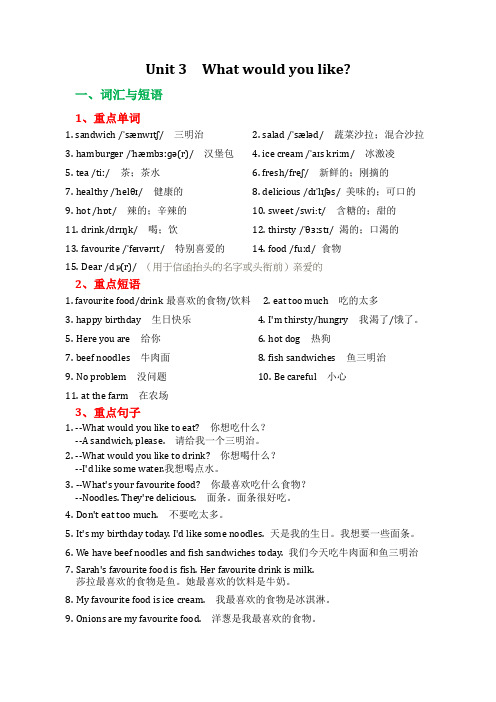
Unit 3 What would you like?一、词汇与短语1、重点单词1. sandwich /ˈsænwɪtʃ/ 三明治2.salad /ˈsæləd/ 蔬菜沙拉;混合沙拉3.hamburger /ˈhæmbɜːɡə(r)/ 汉堡包4.ice cream /ˈaɪs kriːm/ 冰激凌5.tea /tiː/ 茶;茶水6.fresh/freʃ/ 新鲜的;刚摘的7.healthy /ˈhelθɪ/ 健康的8.delicious /dɪˈlɪʃəs/ 美味的;可口的9.hot /hɒt/ 辣的;辛辣的10.sweet /swi:t/ 含糖的;甜的11.drink/drɪŋk/ 喝;饮12.thirsty /ˈθɜːstɪ/ 渴的;口渴的13.favourite /ˈfeɪvərɪt/ 特别喜爱的14.food /fuːd/ 食物15.Dear /dɪə(r)/ (用于信函抬头的名字或头衔前)亲爱的2、重点短语1. favourite food/drink最喜欢的食物/饮料2.eat too much 吃的太多3.happy birthday 生日快乐4.I'm thirsty/hungry 我渴了/饿了。
5.Here you are 给你6.hot dog 热狗7.beef noodles 牛肉面8.fish sandwiches 鱼三明治9.No problem 没问题10.Be careful 小心11.at the farm 在农场3、重点句子1. --What would you like to eat? 你想吃什么?--A sandwich, please. 请给我一个三明治。
2. --What would you like to drink? 你想喝什么?--I'd like some water.我想喝点水。
3.--What's your favourite food? 你最喜欢吃什么食物?--Noodles. They're delicious. 面条。
XX年五年级英语上册重点与练习(新人教版)

XX年五年级英语上册重点与练习(新人教版)本资料为woRD文档,请点击下载地址下载全文下载地址五年级上册英语知识点归纳Book5Unit1myNewTeachers一.知识点归纳词汇old年老的funny滑稽可笑的四会:tall高的kind和蔼的亲切的young年轻的strict严格的short矮的smart聪明的巧妙地thin瘦的active积极的活跃的strong强壮的quiet安静的,文静的who’s=whois谁是what’s=whatis是什么lady女士mr.先生like像、喜欢其他:very非常but但是三会somuch,很非常principal校长universitystudent大学生he’s=heis他是she’s=sheis她fun有趣,逗笑2句型(1)询问人-----who’syourmathteacher?-----missZhao.你们的数学老师是谁。
是赵老师。
-----who’sthatwoman?-----Sheismymother.那个妇女是谁?她是我妈妈。
询问人的外貌特征-----what’shelike?-----He’stallandstrong.他长什么样子?他很高很健壮。
-----Issheveryold?-----No,sheisveryyoung.-----Isheveryshort?-----No,sheisn’t.Sheisverytall.询问人的性格特点-----Issheveryquiet?-----No,sheisn’t.She’sveryactive.她很文静吗?不,她很活跃。
-----Issheverystrict?-----yes,sheis.Butsheisverykind.她很严厉吗?是的。
3.语法:、动词的第三人称单数:(当一个句子中的人物是第三人称单数,并且这个句子又是一般现在时态时,该句子中的动词要使用第三人称单数形式。
人教版五年级英语上全册重点和习题
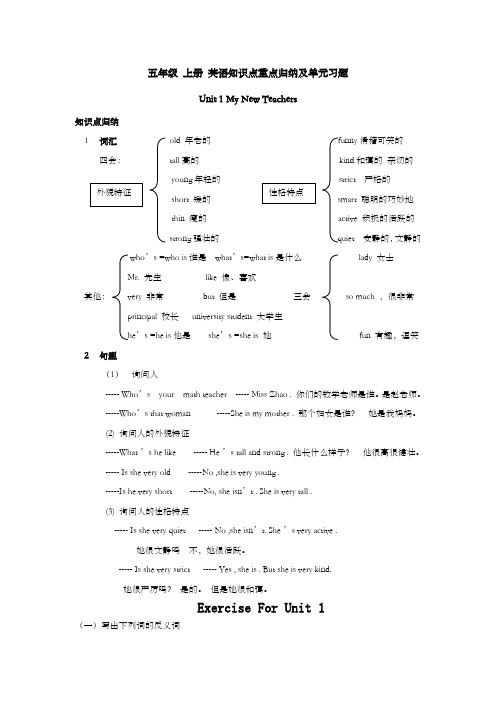
五年级 上册 英语知识点重点归纳及单元习题Unit 1 My New Teachers知识点归纳1 词汇old 年老的滑稽可笑的 四会: tall 高的 kind 和蔼的 亲切的 young 年轻的 strict 严格的 short 矮的 smart 聪明的巧妙地thin 瘦的 active 积极的活跃的strong 强壮的 quiet 安静的,文静的 who ’s =who is 谁是 what ’s=what is 是什么 lady 女士Mr. 先生 like 像、喜欢其他: very 非常 but 但是 三会 so much ,很非常principal 校长 university student 大学生he ’s =he is 他是 she ’s =she is 她 fun 有趣,逗笑 2 句型(1) 询问人----- Who ’s your math teacher ----- Miss Zhao . 你们的数学老师是谁。
是赵老师。
-----Who ’s that woman -----She is my mother . 那个妇女是谁? 她是我妈妈。
(2) 询问人的外貌特征-----What ’s he like ----- He ’s tall and strong . 他长什么样子? 他很高很健壮。
----- Is she very old -----No ,she is very young .-----Is he very short -----No, she isn ’t . She is very tall .(3) 询问人的性格特点----- Is she very quiet ----- No ,she isn ’t. She ’s very active .她很文静吗 不,她很活跃。
----- Is she very strict ----- Yes , she is . But she is very kind.她很严厉吗? 是的。
最新完整人教版五年级英语上册第五单元知识点归纳总结及作文范文

Unit 5 There is a big bed一、词汇与短语1、重点单词1. clock /klɒk/ 时钟;钟2.plant /plɑːnt 植物3.bottle /ˈbɒtl/ 瓶子4.bike /baɪk/ 自行车;脚踏车5.photo /ˈfəʊtəʊ/ 照片;相片6.front /frʌnt/ 正面7.between /bɪˈtwiːn/ 在……中间8.above /əˈbʌv/在(或向)……上面9.beside /bɪˈsaɪd/ 在旁边(附近)10.behind /bɪˈhaɪnd/ 在(或向)…后面11.there /ðeə(r)/(表示存在或发生)12.their /ðeə(r)/ 他们/她们/它们的13.house/haʊs , haʊz/ 房屋;房子;住宅14.lot/lɒt/ 大虽;许多15.flower /ˈflaʊə(r)/ 花;花朵16.move /muːv/ 搬家17.dirty /ˈdɜːtɪ/ 肮脏的18.mouse /maʊs/ 老鼠19.everywhere /ˈevriweə(r)/ 处处;到处20.grandparent /ˈɡrænpeərənt/ 祖父;祖母;外祖父;外祖母2、重点短语1. water bottle 水瓶2. in front of 在……前面3.a lot of = lots of 大量;许多4.so many pictures 许多照片5.many pretty flowers 很多漂亮的花6.in the room 房间里面7.beside the bed 在床旁边8.a nice photo 一张漂亮的照片9.on the desk 在桌子上10.in the picture 在图片中11.on the plate 在盘子上12.in my room 在我房间里13.in front of the house 在房子前面14.lots of flowers 许多花15.move into…搬进…16.on the floor 在地板上17.everywhere 到处,处处18.behind my computer 在我电脑后面19.near the nature park在自然公园附近20.above the desk 在桌子下面21.beside the river 在河边22.go home 回家23.poor can 可怜的罐头24.be late for school 上学迟到了25.between two fish 两条鱼之间26.Over Rabbit 在兔子头顶上3、重点句子1. There is a big bed. (这里)有张大床。
新人教版五年级英语上册知识点
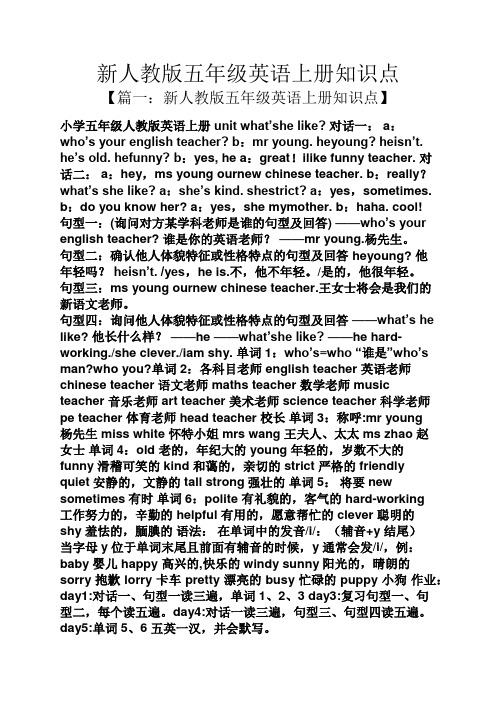
新人教版五年级英语上册知识点【篇一:新人教版五年级英语上册知识点】小学五年级人教版英语上册unit what’she like? 对话一: a:who’s your english teacher? b:mr young. heyoung? heisn’t. he’s old. hefunny? b:yes, he a:great!ilike funny teacher. 对话二: a:hey,ms young ournew chinese teacher. b:really?what’s she like? a:she’s kind. shestrict? a:yes,sometimes. b:do you know her? a:yes,she mymother. b:haha. cool!句型一:(询问对方某学科老师是谁的句型及回答) ——who’s your english teacher? 谁是你的英语老师?——mr young.杨先生。
句型二:确认他人体貌特征或性格特点的句型及回答 heyoung? 他年轻吗?heisn’t. /yes,he is.不,他不年轻。
/是的,他很年轻。
句型三:ms young ournew chinese teacher.王女士将会是我们的新语文老师。
句型四:询问他人体貌特征或性格特点的句型及回答——what’s he like? 他长什么样?——he ——what’she like? ——he hard-working./she clever./iam shy. 单词1:who’s=who “谁是”who’s man?who you?单词2:各科目老师 english teacher 英语老师chinese teacher 语文老师 maths teacher 数学老师 musicteacher 音乐老师 art teacher 美术老师 science teacher 科学老师pe teacher 体育老师 head teacher 校长单词3:称呼:mr young杨先生 miss white 怀特小姐 mrs wang 王夫人、太太 ms zhao 赵女士单词4:old 老的,年纪大的 young 年轻的,岁数不大的funny 滑稽可笑的 kind 和蔼的,亲切的 strict 严格的 friendlyquiet安静的,文静的 tall strong强壮的单词5:将要new sometimes有时单词6:polite 有礼貌的,客气的 hard-working工作努力的,辛勤的 helpful 有用的,愿意帮忙的 clever 聪明的shy 羞怯的,腼腆的语法:在单词中的发音/i/:(辅音+y 结尾)当字母y 位于单词末尾且前面有辅音的时候,y 通常会发/i/,例:baby 婴儿 happy 高兴的,快乐的 windy sunny阳光的,晴朗的sorry 抱歉 lorry 卡车 pretty 漂亮的 busy 忙碌的 puppy 小狗作业:day1:对话一、句型一读三遍,单词1、2、3 day3:复习句型一、句型二,每个读五遍。
- 1、下载文档前请自行甄别文档内容的完整性,平台不提供额外的编辑、内容补充、找答案等附加服务。
- 2、"仅部分预览"的文档,不可在线预览部分如存在完整性等问题,可反馈申请退款(可完整预览的文档不适用该条件!)。
- 3、如文档侵犯您的权益,请联系客服反馈,我们会尽快为您处理(人工客服工作时间:9:00-18:30)。
XX年五年级英语上册重点与练习(新人教版)五年级上册英语知识点归纳Boo5Unit1yNeTeachers一.知识点归纳词汇old年老的funny滑稽可笑的四会:tall高的ind和蔼的亲切的young年轻的strict严格的short矮的sart聪明的巧妙地thin瘦的active积极的活跃的strong强壮的quiet安静的,文静的ho’s=hois谁是hat’s=hatis是什么lady女士r.先生lie像、喜欢其他:very非常but但是三会souch,很非常principal校长universitystudent大学生he’s=heis他是she’s=sheis她fun有趣,逗笑句型询问人-----ho’syourathteacher?-----issZhao.你们的数学老师是谁。
是赵老师。
-----ho’sthatoan?-----Sheisyother.那个妇女是谁?她是我妈妈。
询问人的外貌特征-----hat’shelie?-----He’stallandstrong.他长什么样子?他很高很健壮。
-----Issheveryold?-----No,sheisveryyoung.-----Isheveryshort?-----No,sheisn’t.Sheisverytall.询问人的性格特点-----Issheveryquiet?-----No,sheisn’t.She’sveryactive.她很文静吗?不,她很活跃。
-----Issheverystrict?-----yes,sheis.Butsheisveryind.她很严厉吗?是的。
语法:动词的第三人称单数:have—haslie—liesdo—doesgo —goesatch--atches词语变化:fun――funnyfunny――funno――no反义词:tall—shortlong—shortyoung—oldstrong—thinactive—quietind—strictactive—quiet3、belie与dolie:在本单元中,hat’s…lie?的句型是主句型,这里的lie是“像…一样”的意思.hat’s…lie?是问某某长得什么样子。
它的答语一般用:He/She/Itis…,如:hat’syourfatherlie?你爸爸长得什么样子?。
而在dolie的句子中,lie的意思才是“喜欢”的意思。
如:hatdoesyourfatherlie?你爸爸喜欢什么?r—先生iss—小姐rs—夫人,女士语音:字母组合:eapeachteaseatjeans字母组合:eebeefsheepqueensleepUnit2ydaysoftheee一、本单元知识重点:词汇onday星期一chineseTuesday星期二athednesday星期三subjectEnglisheeThursday星期四artFriday星期五usicSaturday星期六P.E.Sunday星期日sciencedohoeor做家庭作业dohouseor做家务事atchTV看电视readboos读书playping-pong打乒乓球onSaturday在星期六hatabout…?…怎么样?playputergaes玩电脑游戏day天have有;吃too也;太on在…时候二、句型本单单元重点学习怎样问星期及怎样回答。
今天是星期几?hatdayisittoday?今天是星期一。
It’sonday..问星期的某天常干什么事及回答。
你星期六常干什么?hatdoyouoftendoonSaturday?我常做家庭作业.Ioftendohoeor.你们星期三常上些什么课?hatdoyouhaveonednesday?我们上语文、数学和英语.ehavechineseathandEnglish..hataboutyou?那你呢?johnliesondaysandFridays,becauseheliesP.E.三、语法:当介词in,on,at后面跟表示时间的词语时,表示在某年或某月,用in.如inay在五月。
In1988,在1988年。
表示在某段时间,如在上午,下午,晚上也用in.如intheorning,intheafternoon,intheevening.表示在某日,在星期几时,用on。
如ononday,onSunday.表示在几点几分,在具体时间时,用at.如at6:30,at9o’cloc.Ilieondays.johnliesSundays.这里的lies是lie的第三人称单数形式,在一般现在时的句子中,如果主语是第三人称单数,注意动词要变成三单形式。
理解、区分这两个句型A:hatdoyouhaveonondays?B:ehavechinese,English,athan dscienceonondays.A:hatdoyoudoonondays?B:Ioftendohoe or,readboosandatchTV..语音:字母组合:ohotonbronno字母组合:ouourouthountainhouseUnit3hat’syourFavouriteFood?词汇eggplant茄子seet甜的vegetabletoato西红柿sour酸的greenbeans青豆tastehot辣的cabbage卷心菜salty咸的potato土豆fresh新鲜的carrot胡萝卜tasty好吃的onion洋葱healthy健康的cucuber黄瓜unhealth不健康的chicen鸡肉por猪肉breafast早餐eatbeef牛肉ealslunch中餐utton羊肉dinner/supper晚餐others:tofufishfruitgroup句型:--------hatouldyoulieforbreafast/lunch/dinner?--------I’dlie…--------hatdoyouhaveforbreafast/lunch/dinner…?--------Ihave…--------hatdoes…have…?--------He/Shehas…--------hat’syourfavouritefood/fruit?--------Ilie….It’s/They’re…--------hataboutyou?--------Doyoulie…?---Does…lie…?yes,Ido.They’re/It’s…yes,she/hedoes.No,Idon’t.They’re/It’s…No,she/hedoesn’t.--------etoo.--------Idon’tlie…They’re/It’s…Thatsoundsgood.听起来不错三.语法:Ihaveeggplantandtoatoesforlunch.我午饭吃茄子和西红柿。
这里的eggplant是指一道菜,是被切碎了的,熟的,所以这里的eggplant是不可数名词,不能用复数形式。
西红柿toato和土豆potato复数形式在后面加estoatoes,potatoesfish当表示为活的鱼的时候,是可数的,但它是单复数同形;当表示为鱼肉的时候,是不可数的。
cabbage当表示是一种包菜的数量时,是不可数名词,表示为cabbage;当表示不同种类的包菜时,是可数名词,表示为cabbageseggplant当表示是未经过烹饪的蔬菜时,是可数名词,表示为eggplants;当表示经烹饪过的菜肴时,是不可数名词,表示为eggplant常见的肉类为不可数名词,poruttonbeef等 2.下列单词的形容词形式:health---healthytaste---tastyhat’syourfavoritefood?后面一般都跟集合的名词:food食物fruit水果drin饮料colour颜色class课程boo 书sport运动vegetable蔬菜nuber数字day天四.语音:字母组合:oindoyellosnogro字母组合:oacoatboatgoatroadUnit4hatcanyoudo?一、词汇seepthefloor扫地cootheeals做饭athoe在家ill有病的cleanthebedroo打扫卧室ashtheindos擦窗justdoit 就这么干吧aterthefloers浇花ashtheindos擦窗justdoit就这么干吧eptythetrash倒垃圾haveatry试一试robot机器人ashtheclothes洗衣服setthetable摆饭桌;摆餐具playchess下棋helpful有用的有帮助的aethebed铺床dothedishes洗碗碟putaaytheclothes收拾衣服useaputer使用计算机dohouseor做家务二、句型。
-------hatcanyou/he/Ido?你/他/我能做什么?------I/He/youcan….我/他/你能….-----canyou/I/he…?你/我/他能…吗?-----yes,I/you/hecan./No,Ican’t.是的,我/你/他能。
/不,我不能。
ButI‘dlietohaveatry.但是我想试一下。
三、语法。
结构:主语+can+动词原形。
主语没有人称和数的变化。
“.表示能…”如:Icanseepthefloor.我能扫地。
youcanseepthefloor.你能扫地。
Hecanseepthefloor.他能扫地。
Theycanseepthefloor.他们能扫地。
陈述句肯定式:主语+can+动词原形。
如:Icancootheeals.我会做饭。
陈述句否定式:主语+can+not+动词原形。
如:Icannot/can’tcootheeals.我不会做饭。
句式一般疑问式及回答:can+主语+动词原形?如:----canyoucootheeals?你会做饭吗?-----yes,Ican./No,Ican’t.会,我会。
/不,我不会。
特殊疑问式:hat+can+主语+do?如:hatcanyoudo?你会做什么?注意点:当句子中出现了情态动词can或其否定形式can’t时,其他的动词要用原形四.语音:orshortforhorsestoralltallsallballhallUnit5hatcanyouDo?一、词汇四会air—conditioner空调in在……里面curtain窗帘on在……上面杂物trashbin垃圾箱介词under……在下面closet壁橱,near……在旁边irror镜子behind……在后边endtable床头柜over在上面infrontof在前面bedroolooatitchenon房间bathroo三会flatlivingroothirdortell二、句型①——hatisyourroolie?——Thereare/Thereis…Ihave…三、介词①on在…上,在…旁,在…时候,关于…Thereisabooonthedes..桌上有一本书。
